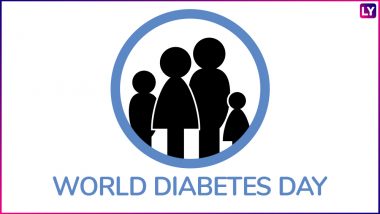Diabetes mellitus, otherwise known simply as diabetes or its unfortunate nickname ‘the silent killer’, claimed 4 million lives in 2017. The disease has assumed a crisis-like proportion today, raising risks for other illnesses like kidney failure, stroke, heart attack and limb amputation. Unfortunately, despite being such a deadly illness, only 16 percent of the cases are detected on time and rest are accidental discoveries. Early intervention can help save lives, for which better awareness is necessary. To facilitate this and to commemorate Sir Frederick Banting’s birthday (who co-discovered insulin) every year on November 14, WHO and International Diabetes Federation celebrate World Diabetes Day. This year, the day is centred on the theme ‘The Family and Diabetes.’ It’s relevant because family and diabetes both affect each other. Here’s how.
1 Diabetes Runs In The Family
Diabetes generally runs in the family. Having a close relative with the disease increases one’s risk for diabetes. According to Dr Aarti Ullal, Diabetology, Junior Consultant Endocrinology, Global Hospitals, Mumbai, the risk of developing type 2 diabetes is 1 in 7 if one of your parents was diagnosed before the age of 50; 1 in 13 if one of your parents was diagnosed after the age of 50; and 1 in 2 if both your parents have diabetes. Symptoms, Causes and Treatment of The Health Condition Caused By High Blood Sugar.
About Type 1 diabetes, she adds: “According to Harvard School of Public Health, if an immediate relative (parent, brother, sister, son or daughter) has type 1 diabetes, one's risk of developing type 1 diabetes is 10 to 20 times the risk of the general population; your risk can go from 1 in 100 to roughly 1 in 10 or possibly higher, depending on which family member has diabetes and when they developed it.” Lack of Interest in Sex, Infertility and Other Symptoms of Diabetes in Women.
Dr Ullal also says that if one child in a family has type 1 diabetes, their siblings have around a 1 in 10 risks of developing it by age 50.
2 A Shared Lifestyle Increases Your Risk
The greatest influence on our lifestyle and our diet choices is often the family. We learn our eating habits from our parents. Type 2 diabetes can be greatly affected by the lifestyle and dietary habits of family members, according to Dr Ullal. “If you don’t see the people around you exercising, eating healthy food or maintaining a healthy weight, the odds are higher you will also struggle with obesity and find yourself at risk for type 2 diabetes and its complications,” she adds. Include These 5 Foods That Lower Blood Sugar In Your Diet.
3 Despite Genetic Risks, Early Signs Are Not Detected
According to IDF, despite the majority of people having a family member with diabetes, four-in-five parents have trouble recognising signs of diabetes in their own children. And one-in-three wouldn’t spot symptoms of type 1 diabetes at all.
Diabetes concerns every family, that’s why spotting the early warning signs is important to avoid the consequences of the disease. If diabetes is left untreated or unmanaged, it can lead to life-changing complications such as blindness, kidney failure, heart attack, stroke, etc.
“It is vital everyone learns to identify the warning signs of diabetes. Sadly, diabetes can be easily missed or mistaken for something else, and this leaves people – whether children or adults – vulnerable to serious consequences,” said Prof. Nam H. Cho, IDF President.
4 Family Support Can Influence Disease Outcomes
Social and behavioural scientists who have studied the link between disease management and social support say that familial support does impact patients’ health by reducing stress, increasing self-efficiency and influencing change in unhealthy behaviour.
A study by Rosland et al. found that the emotional support given by family and friends makes a positive difference in the disease management in people with diabetes. Another by Pereira et al. says that stable families result in better blood sugar control among diabetic patients. Other studies also draw a link between the patient’s marital status and adherence to treatment. A study by DiMatteo proves that married patients were 1.27 times likely to stick to their treatment as opposed to unmarried people.
Families can also have a negative impact on health outcomes. Competing demands of family members become obstructions in self-management of diabetes. For example, when family members refuse to eat the foods cooked with a diabetic patient in mind, it can negatively impact the patient’s health by limiting his or her time and energy. It can also cause unnecessary stress in the patient.
4 Diabetes Affects Livelihoods
While families have an impact on diabetes management, diabetes can also impact families. Management of diabetes and its treatment requires daily treatment, regular monitoring, healthy lifestyle and awareness. But everything comes at a cost. According to IDF reports, the cost of insulin injection and daily monitoring of blood sugar levels can put a severe dent in the family’s average disposable income. Many families are also driven to abject penury, in a bid to afford essential diabetes medicines. Bringing affordable medicines to the individual and family can eventually also impact health outcomes.
(The above story first appeared on LatestLY on Nov 14, 2018 12:13 PM IST. For more news and updates on politics, world, sports, entertainment and lifestyle, log on to our website latestly.com).













 Quickly
Quickly


